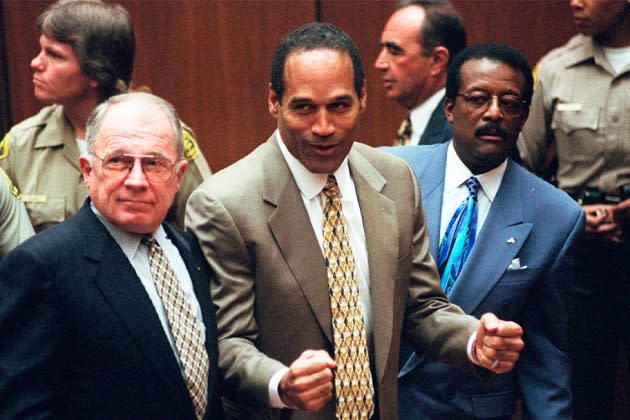How O.J. Simpson’s Impact on Media Coverage Still Leaves Mixed Feelings Among Broadcast Journalists
- Oops!Something went wrong.Please try again later.
- Oops!Something went wrong.Please try again later.
- Oops!Something went wrong.Please try again later.

Dan Abrams has enjoyed a tremendously successful career, which currently includes roles as chief legal analyst at ABC News and host of NewsNation’s “Dan Abrams Live.” But he knows it was the O.J. Simpson murder trial almost 30 years ago that put him on the map — and he has complicated feelings about it.
“I’ve always had a little bit of guilt about the idea that the murderers of two innocent people helped start my career,” says Abrams, who was working for Court TV at the time. “But it was a legal event, and I was covering the legal story.”
More from Variety
The Rise and Fall of O.J. Simpson Changed Media Culture Forever
Caitlyn Jenner Posts 'Good Riddance' After O.J. Simpson's Death
Abrams obviously wasn’t the only one. There has never been a media frenzy quite like the one that surrounded Simpson, a once-beloved sports icon who was accused of killing his ex-wife, Nicole Brown Simpson, and Ron Goldman. Although he was acquitted of those charges, Simpson was then found liable for their deaths in civil court.
Simpson’s death on April 10 — of prostate cancer at age 76 — gave journalists a reason to reflect on the lasting impact of Simpson on TV news both in Los Angeles and nationwide.
“It was not a great story to cover. It was not fun,” says KABC anchor Marc Brown, who reported daily from the Simpson murder trial. “It was tedious. It was emotional. There were people on various sides of whether he was guilty or innocent accusing us of one thing or another. Plus, people were leaking things selectively to different news outlets, so it became this competition. People kind of lost sight of the fact that this was a murder trial and two people had been brutally slain.”
It was clear that this would be unlike any other story from the very beginning, when every network broke into its schedule to broadcast coverage of police pursuing Simpson in a white Ford Bronco on L.A. freeways. It wasn’t the first time a car chase had been telecast on L.A. stations — but after that event, police pursuits became a staple of local TV.
“I don’t remember covering a chase on the air live up to that point,” says KNBC anchor Colleen Williams.
Then came the trial. Because Judge Lance Ito allowed cameras in the courtroom, it was covered live nationally on CNN and Court TV, as well as locally on L.A.’s broadcast stations. “It was such a huge deal for the station to blow out all commercials Monday through Friday,” Williams remembers. “We covered it gavel to gavel every single day, every moment. And then at the end of the day, we did a 30-minute special with a summary of what happened in court that day.”
Although local news stuck mostly to the facts, the overall circusalso spilled into popular culture , from tabloids reporting the more salacious aspects of the case to “The Tonight Show With Jay Leno” regularly bringing out the “Dancing Itos,” a troupe of Judge Ito imitators.
“I remember a time where the news of the day was about what [prosecutor] Marcia Clark was wearing to the courthouse,” says KCBS/KCAL anchor Pat Harvey. “I don’t know how you would have avoided that, simply because it was carried live every day. It was right in front of our faces.”
Abrams notes that the Simpson case set the tone for cable news, a year before Fox News and MSNBC launched as CNN competitors. “I don’t think that it has had a negative impact on journalists,” he says, “unless you believe that cable news is bad for journalism. It’s hard to blame the O.J. Simpson case for cable news. But there’s no doubt, the O.J. Simpson case had an impact on cable news.”
Brown says the jury’s still out on what journalists learned from the Simpson case — if anything. “We just have to be a little bit more careful in our gavel-to-gavel coverage and driving expectations about what sort of verdict will come,” he says. “We got that wrong with the Rodney King case and I think we got it wrong in the Simpson case.”
And maybe it’s hard to put Simpson into context because it was such an unusual event. Abrams doesn’t think it will ever be duplicated: “It happened at a unique time in a unique place with someone who was one of the most famous people in America,” he says. “I am convinced that there will never be another perfect storm like that.”
Best of Variety
Sign up for Variety’s Newsletter. For the latest news, follow us on Facebook, Twitter, and Instagram.
